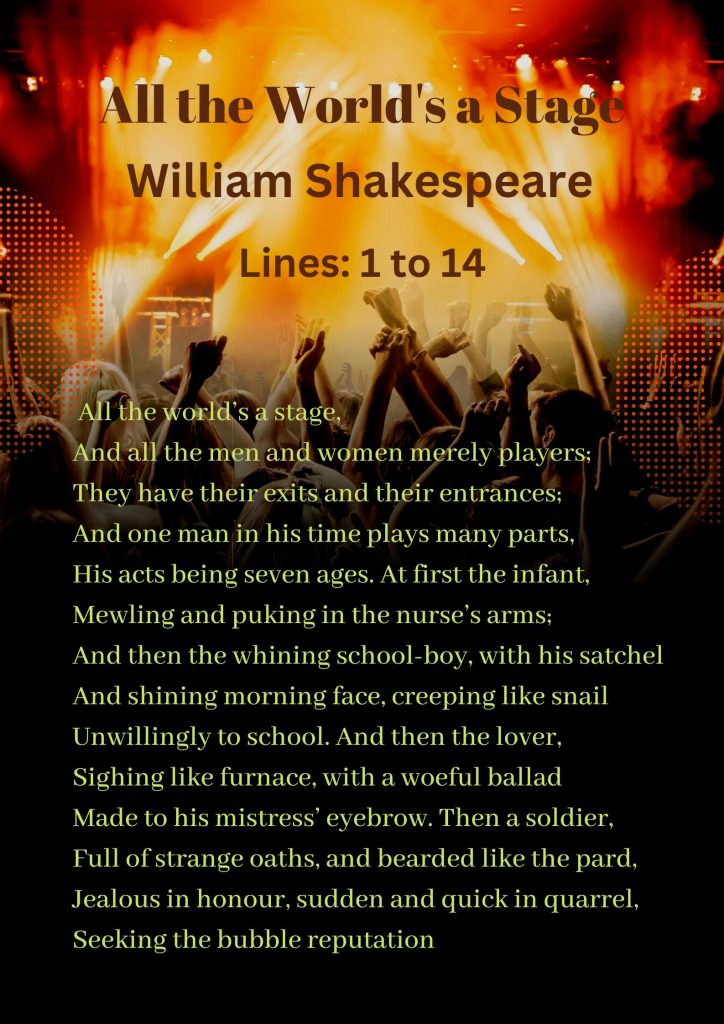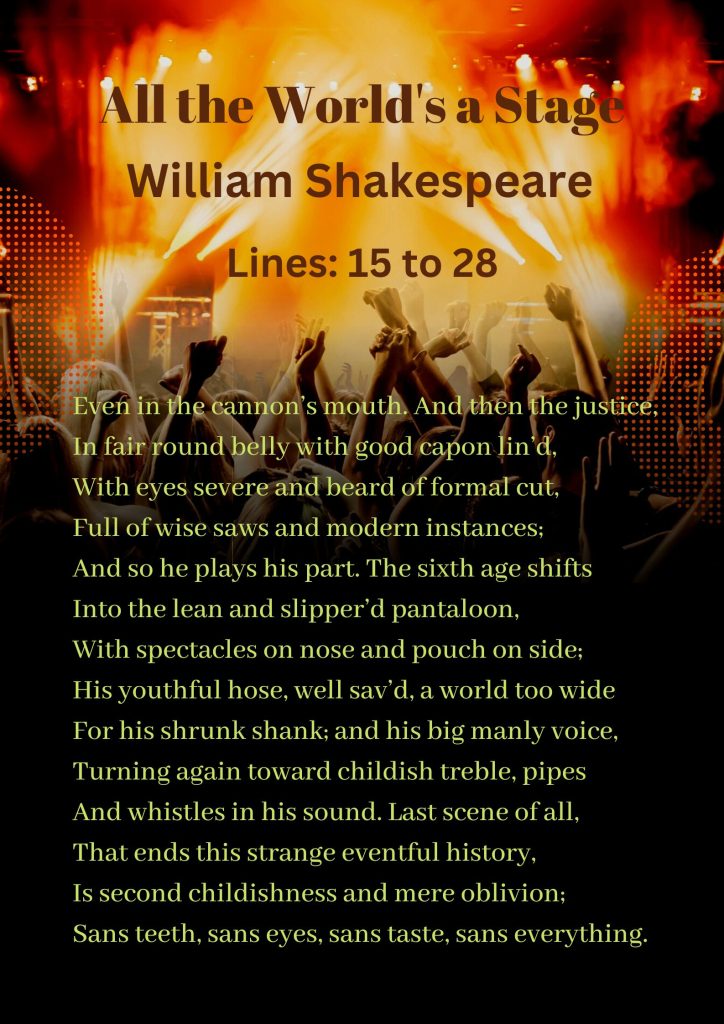Introduction
All the World’s a Stage by William Shakespeare presents a comparison of this world to a stage where human beings are actors. They play different roles in different phases of the drama of life. All the World’s a Stage by William Shakespeare is a monologue from one of Shakespeare’s pastoral comedies, As You Like It, which he wrote in 1599. A character, Jaques, speaks these lines in Act II, Scene VII of the play. It is not the only instance where Shakespeare has used the stage as a metaphor for this world. We find a similar reference in The Merchant of Venice which Shakespeare wrote (probably) in 1596. In Act I, Scene I, Antonio, one of the leading characters, says:
Lines from The Merchant of Venice
I hold the world but as the world, Gratiano;
A stage where every man must play a part,
And mine a sad one.
This article, All the World’s a Stage by William Shakespeare, will assist students and instructors in comprehending the poet’s approach.
The Poet
William Shakespeare was born in Stratford-upon-Avon, Warwickshire, England. He was baptized on April 26, 1564. Shakespeare is the most celebrated poet and playwright in England. He also enjoyed a successful career as an actor. We may assess his reputation by the fact that his literary creations have maintained appeal and inspiration over four centuries. Literary circles also know him as England’s national poet. He is also famous as ‘the Bard’. The tragedies, the comedies, and the sonnets that he wrote achieved timeless grandeur. Shakespeare’s frequently referred to tragedies are Hamlet, King Lear, Macbeth, Othello, and Romeo and Juliet. Among his comedies are All’s Well That Ends Well, The Comedy of Errors, and Much Ado about Nothing. All the World’s a Stage by William Shakespeare is also an extract from a comedy, As You Like It. Shakespeare died on April 23, 1616.
Text of All the World’s a Stage by William Shakespeare


Summary of All the World’s a Stage by William Shakespeare
Introduction
All the World’s a Stage by William Shakespeare is based on his approach to life. It is a monologue that a character, Jaques, speaks in one of his pastoral comedies, As You Like It. Different writers, of different ages, have used different metaphors to stand for this world and life in it. Shakespeare, as he belonged to the world of theatre, found the stage an apt metaphor for this world. To him, human beings are mere actors who enter the stage, play their roles, and take their exits as they die. Shakespeare believes that everybody has to play seven different roles in his life. In this way, he divides human life into seven different phases.
The First Stage of Man’s Life
The first stage of man’s life is infancy. It is man’s first role in this world. In this phase of life, man is dependent on others. He cries and vomits in the arms of his nurse. At this age, man does not participate in the activity of life of his free will. He depends entirely on his nurse.
The Second Stage of Man’s Life
The second stage of a man’s life is that of a schoolboy. At this age, he begins to take responsibility. His first responsibility is to acquire knowledge. For the attainment of this purpose, his parents send him to school. It seems to him an unpleasant experience. But he cannot exercise his free will. He has to go to school, though reluctantly. His face is shining and his uniform is bright, but he is not willing to go to school. Therefore, he walks at a snail’s pace with his heavy bag on his shoulder.
The Third Stage of Man’s Life
In the third stage, he becomes a lover. He experiences his first emotions of adolescence. To him, the world without his beloved is a void. He looks sad and dejected all the time. His breaths are the breath of a furnace. He writes poetry on different aspects of the beauty of his beloved.
The Fourth Stage of Man’s Life
The fourth stage of man’s life is a step into practical life. He becomes a soldier and takes strange oaths. His beard resembles that of a leopard. He becomes more impatient and seeks a temporary reputation. He is ready to face cannons and lose his life in the name of honour.
The Fifth Stage of Man’s Life
Having played his role as a soldier, he now becomes a judge. His body loses its youthful shape and he grows fat like a domestic cock. There is severity in his eyes. He keeps a formal beard. He takes pride in the knowledge and experience he possesses. Therefore, his statements are full of wise saws and their contemporary examples.
The Sixth Stage of Man’s Life
In the sixth stage, he becomes old. His voice loses its former resonance and sense of authority. He becomes very weak. The dresses, which used to be fit, turn very loose. He always carries a pouch with him.
The Seventh/Last Stage of Man’s Life
Shakespeare describes the last stage of man’s life as the second infancy. In this stage, his voice breaks into the shrill treble of a child’s. Once again, he becomes dependent on others. He has no teeth, no sense, and no feeling intact in him.
Conclusion
Shakespeare has depicted all the stages of life with perfection and beauty. This piece of poetry shows not only his experience as a stage artist but also his deep insight into human life. It is reflective of his profound observation.
Important Questions
Q1: Which age in All the World’s a Stage has been depicted the best by Shakespeare?
Q2: Do you agree with Shakespeare’s division of human ages in All the World’s a Stage?
Q3: Do you think Shakespeare’s use of the stage as a metaphor for the world in All the World’s a Stage is appropriate?
Aptness of the Use of the Stage As a Metaphor for the World
All the World’s a Stage by William Shakespeare deals with his philosophy of the world and the life in it. Shakespeare has used the stage as a metaphor for this world. It implies that life for him is a drama with a storyline and a plot. He compares human beings to the actors who follow the storyline and the plot of the drama of life. There may be two arguments to justify Shakespeare’s use of the stage as a metaphor for the world.
The First Argument
The basis of this argument is Shakespeare’s mastery of comparison. Having suggested the stage as a metaphor for the world, he immediately describes the seven phases of life. While doing so, he relates the whole story of a man’s life. A critical look at Shakespeare’s delineation of the seven stages of life inspires the reader to admit the appropriateness of the metaphor. Also, we know that the drama being presented on the stage is a replica of real life. It emanates from life. We play our role in the drama of life in the same way as the actors do the same on the stage. It impels the reader to admit the appropriateness of the metaphor.
The Second Argument
This argument has a general, social basis. It is a common observation that a man generally uses his immediate experience to draw any comparison. For a professional driver, this world may be a bus and life a journey. During this journey, a man meets many other passengers who travel with him. There are many stops till the final destination. Similarly, for a gardener, the world may be a garden. The flowers and the thorns may stand for pleasures and problems of life respectively. We can make an endless list of such comparisons. When we see Shakespeare’s use of the stage as a metaphor in light of such instances, it seems acceptable and appropriate. Furthermore, Shakespeare’s depiction of the seven ages of life is very close to reality.
Shakespeare’s Division of Human Ages
In All the World’s a Stage, Shakespeare’s division of life into seven different stages is impeccable. He begins by telling us how a newborn depends entirely on others for his survival. The portrayal of a schoolboy is very interesting. As a school-going child one feels depressed by the various tasks assigned at the school. The monotonous routine of a schoolboy haunts him every morning and he goes to school reluctantly. The depiction of the first youthful emotions of love and desire is also appealing. It is interesting to note that we find many lovers of the same age group around us. The presentation of the role of the soldier and that of the judge is convincing. These stages show a man’s days of maturity. The delineation of old age is a perfect one. However, Shakespeare wins real praise as he mentions the final stage of life as the second infancy.
Conclusion
There is no denying the fact that Shakespeare is by far the greatest English poet and playwright. In this extract from his play, As You Like It, he has beautifully depicted every age of life.




[…] Click for an excellent article on All the World’s a Stay by William Shakespeare. […]